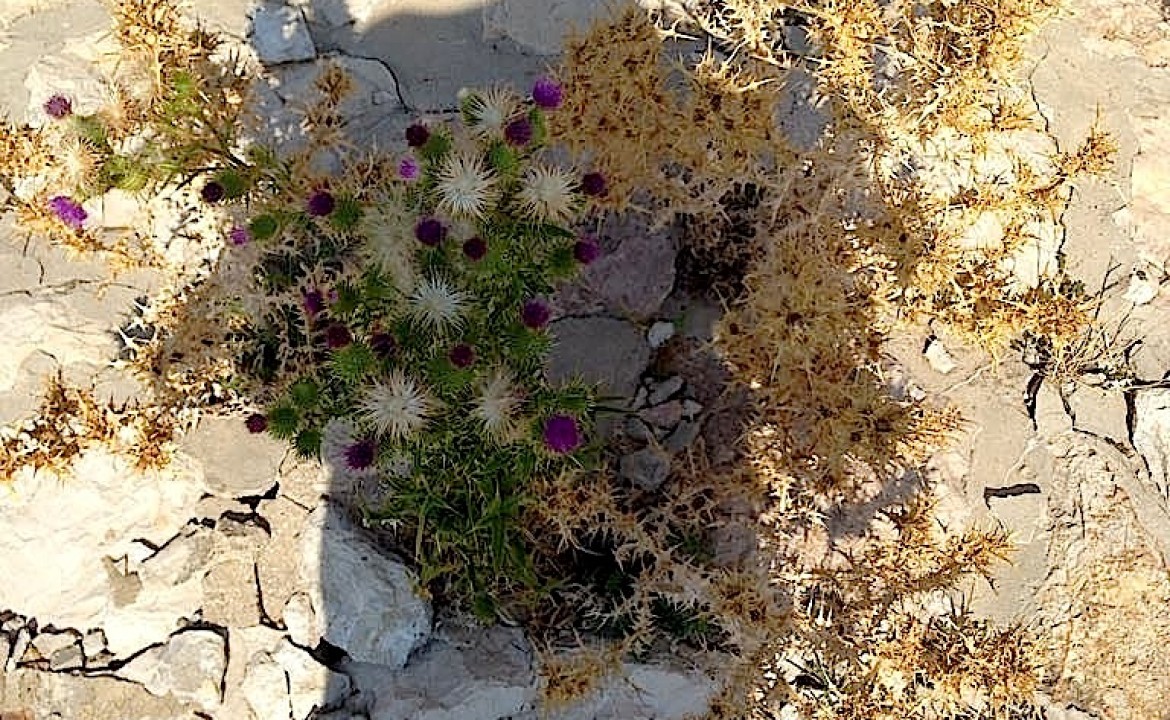Marko Marković, Invisible performance.
Bare Island 2019.
In addition to stone processing, timber, mechanical engineering, and construction, agronomy was also present as an economic branch of production on the Goli Otok. Fruit and vegetable farming was an essential work activity within the "transformation" program. One of the methods of torturing political prisoners in the Bare Island (Goli Otok) was to keep the young seedlings in shade. The prisoners would stand for hours next to the plants they were planting, and give shade to them so that they would not fade under the intense sun and extremely high temperatures.
In 2019, Marković performs a solo action without the audience of giving shade to the plant at the Bare Island complex of political prison camps in Former Yugoslavia.
Systematic social devastation, violence, the exploitation of human and natural resources, and the literal stripping of everything that can be grabbed, conquered, consumed, and processed for profit comes from the need for power and dominance. Within the natural spectrum, humans as a dominant species, forged under different political systems, create cataclysmic living conditions, pollution, and devastation of the biosphere on a planet that is suffering from the increased scale of civilization and environmental catastrophe.
Contextualizing the history of Goli Otok (Bare Island) as a place of absolute and permanent violence through which political manipulation and the desire for power is present even today, we look at the phenomenon of the dominant human species as one that conditions social circumstances and brings devastating consequences on a wide scale.
It is exactly these kinds of places of brutal and violent history that should show the nature of human destruction and lead the example for history to not repeat itself.
Goli Otok was a political prison camp established by the Communist party in Former Yugoslavia in the period of 1949 after Informbiro Resolution which escalated regarding the conflict between Tito and Staljin's repressing politics towards Yugoslavia in 1948.
Prisoners were people with a different mindset from the present political system and were sent from many regions of Former Yugoslavia to "reeducation camps". The island was chosen because of the extreme climate, bare stone, and sea location isolation. During these years, prisoners built the whole architectural infrastructure from the islands stone quarry, that after years of devastation still remains partly on the island.Marko Marković, Invisible performance.
Bare Island 2019.
In addition to stone processing, timber, mechanical engineering, and construction, agronomy was also present as an economic branch of production on the Goli Otok. Fruit and vegetable farming was an essential work activity within the "transformation" program. One of the methods of torturing political prisoners in the Bare Island (Goli Otok) was to keep the young seedlings in shade. The prisoners would stand for hours next to the plants they were planting, and give shade to them so that they would not fade under the intense sun and extremely high temperatures.
In 2019, Marković performs a solo action without the audience of giving shade to the plant at the Bare Island complex of political prison camps in Former Yugoslavia.
Systematic social devastation, violence, the exploitation of human and natural resources, and the literal stripping of everything that can be grabbed, conquered, consumed, and processed for profit comes from the need for power and dominance. Within the natural spectrum, humans as a dominant species, forged under different political systems, create cataclysmic living conditions, pollution, and devastation of the biosphere on a planet that is suffering from the increased scale of civilization and environmental catastrophe.
Contextualizing the history of Goli Otok (Bare Island) as a place of absolute and permanent violence through which political manipulation and the desire for power is present even today, we look at the phenomenon of the dominant human species as one that conditions social circumstances and brings devastating consequences on a wide scale.
It is exactly these kinds of places of brutal and violent history that should show the nature of human destruction and lead the example for history to not repeat itself.
Goli Otok was a political prison camp established by the Communist party in Former Yugoslavia in the period of 1949 after Informbiro Resolution which escalated regarding the conflict between Tito and Staljin's repressing politics towards Yugoslavia in 1948.
Prisoners were people with a different mindset from the present political system and were sent from many regions of Former Yugoslavia to "re-education camps". The island was chosen because of the extreme climate, bare stone, and sea location isolation. During these years, prisoners built the whole architectural infrastructure from the islands stone quarry, that after years of devastation still remains partly on the island.
Fact Box
Invisible performance.
Categories
Date
November 16, 2019
-
Alumni
- Marko Markovic (Exhibited)
Pariticipants

